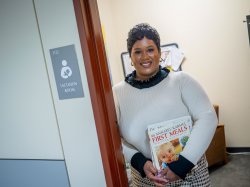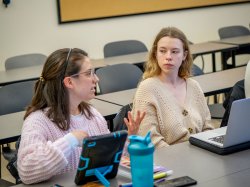Montclair Graduate Students Pioneer Maternal Child Health Nutrition Program
Two nutrition students TRANSCEND research on breastfeeding, prenatal nutrition information
Posted in: Alumni, Graduate School, Homepage News, Nutrition and Food Sciences, Research, University

Two graduate nutrition students are the first from Montclair State University to participate in a program designed to improve maternal and child health and address the need for a diverse health-care workforce. The Translational Training, Education and Leadership Program in Maternal Child Health Nutrition, known as The TRANSCEND Program, is housed in the Department of Nutrition and Food Studies at Montclair State University, Pennsylvania State University and Arizona State University, all Hispanic-Serving Institutions.
Brianna Jack and Sydni Hebert ’23, who will graduate with master’s degrees in Nutrition and Food Science in May, have participated in the yearlong traineeship and conducted thesis research on maternal and child health-related topics, which they have submitted for presentation at Montclair’s Student Research Symposium on April 26 and at the Association of State Public Health Nutritionists annual meeting in Minneapolis this summer. Each received a $15,000 stipend for tuition, additional funds for traveling to conferences and weekly training in public health and maternal child health, leadership and communications through the grant-funded program. In addition, trainees must be working toward becoming registered dieticians and are provided an opportunity to do advocacy and policy work in Washington, D.C.
Associate Nutrition and Food Studies Professor Lauren Dinour, who serves as TRANSCEND’s associate director, says this is the first year of the five-year grant program and that next year, three Montclair students will participate.
“A nation is only as healthy as its maternal population,” Dinour says. “We are looking to train the next generation of maternal child health leaders.”
Noting that “Registered dietitians as a profession historically have been very homogeneous in terms of gender, race and ethnicity,” Dinour says, “part of this program is meant to identify and train underrepresented students in the fields of nutrition and maternal child health. We need more credentialed professionals who look like the communities that they serve.”

Jack, who has a psychology degree from Rutgers and loves cooking, noted how communities of color were hit harder during the COVID-19 pandemic due to underlying conditions, such as obesity, heart disease and diabetes. “What I found so fascinating about a lot of the chronic conditions that just happened to be killers in the United States is that they can be managed or prevented with diet. I just found that so empowering.” That’s when she decided to look at graduate studies in nutrition and found Montclair’s program.
Jack’s TRANSCEND research project and thesis involves content analysis of breastfeeding videos on TikTok. This research endeavor aims to assess the quality and accuracy of such content, shedding light on the critical importance of reliable information in maternal and child nutrition. She is deeply passionate about the subject, as she firmly believes that the state of maternal and child health in the United States is a reflection of society’s overall well-being. Through her studies and research, she is committed to contributing to the improvement of maternal and child health outcomes, ultimately striving to enhance the quality of life for families across the nation.

Noting a gap in research related to breastfeeding content on social media, most of which centers on support groups and attitudes about breastfeeding, Jack chose to examine “the accuracy of content related to breastfeeding” specifically on TikTok. “I’m also looking at the engagement [number of views, likes, comments and shares] that those videos receive. I’m also categorizing the narrators of the videos into four different categories: videos posted by breastfeeding parents, lactation consultants, other health-care providers and lay persons. I’m examining if there’s any relationship between the accuracy of those videos and the type of person that posted it, as well as if there’s any relationship between the accuracy of the videos and how much engagement those videos receive.”
Jack also looked at three specific queries: 1. What are the benefits of breastfeeding? 2. How can I increase my breast milk supply? 3. How do I know whether my baby’s getting enough breast milk?
While she’s still conducting her analysis, Jack has found a lack of accuracy in videos because many people share personal anecdotes about what worked for them and not evidence-based information. She chose TikTok because it is the fastest-growing social media platform.
“It’s important because a lot of people are receiving their information regarding their health from social media, which is free and easy to access,” she says. “This is really an opportunity for major credible health organizations and public health organizations, such as the USDA, to use social media as a tool to get accurate, credible information out there.”
Jack adds: “Children model what they see. So, when Mom has gestational diabetes, hypertension and obesity, the child is more likely to develop those things later in life as well. When we address those issues with Mom, and Mom has a good start, the child will have a good start as well.”

Sydni Hebert, who graduated in 2023 with a bachelor’s in Nutrition and Food Science with a concentration in Dietetics, is working under the mentorship of Associate Nutrition and Food Studies Professor Renata Blumber and Chairperson of the College for Community Health Yeon Bai for her master’s degree. Hebert’s research examines nutrition information sources women use during pregnancy. She looked at how the information influenced pregnant women’s dietary choices and health outcomes during the prenatal period.
Hebert says TRANSCEND trainees learn about “current research that’s going on all across the country all within the scope of nutrition.”
“My research is specifically focused on the nutrition of pregnant women,” she says. Hebert recruited and surveyed pregnant women to determine what source of information they used, “whether it be their health-care provider, the internet, family, friends.” Her survey also asked what sources of information they were looking for and whether they were referred to or saw a registered dietitian or nutritionist before or during pregnancy. She further examined whether they experienced any barriers when searching for information and whether they were happy with the information they found and how they implemented it into their daily life.
“The literature shows that a lot of pregnant women will use their health-care provider as their first source of information,” Hebert says. “However, when they feel that the information doesn’t fit their needs or their health-care provider doesn’t prioritize nutrition, they’ll use the internet as a second source.”
In addition, she examined the behaviors among low-income pregnant women. “Current literature has shown that they’re similar in using health-care providers and the internet. However, a lot of low-income pregnant women will use additional sources like family and friends who have experienced a pregnancy for a lot of the information that they’re looking for.”
Hebert says that while she has yet to complete her data analysis, “We’re looking to gain some more insight about where nutrition education may be lacking. So far, it’s really interesting. … What do we need to do to make information more accessible and easier to understand?”
After graduation, Hebert is hoping to work in a clinical setting, either a hospital or rehabilitation facility, and down the road, hopes to work in the pediatric unit of a hospital. “I’ve always had a passion for the pediatric side of nutrition; it was always the one topic that I was extremely excited to learn about,” she says, adding that The TRANSCEND Program helped expose her to both prenatal and pediatric nutrition. “It really fed my passion.”

Dinour says both Hebert and Jack will submit their research for publication in a peer-reviewed journal. And, she notes that TRANSCEND also will launch TRANSCEND UP, a program targeting undergraduates in nutrition and maternal child health, this summer. Two students will intern with and shadow maternal child health nutrition practitioners as part of an intensive training program and “hopefully create a pipeline for our undergraduate students to then enter our graduate traineeship,” she says.
Story by Staff Writer Sylvia A. Martinez. Photos by John J. LaRosa for Montclair State University.
You May Also Like:
How Effective Communication Can Benefit Scientists
How Student Researchers Can Change the World
Hot Summer Days Ignite Scientific Minds
Entrepreneur Mario M. Casabona Invests in a World of Opportunity at Montclair
